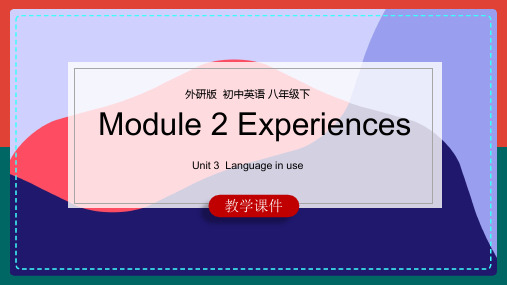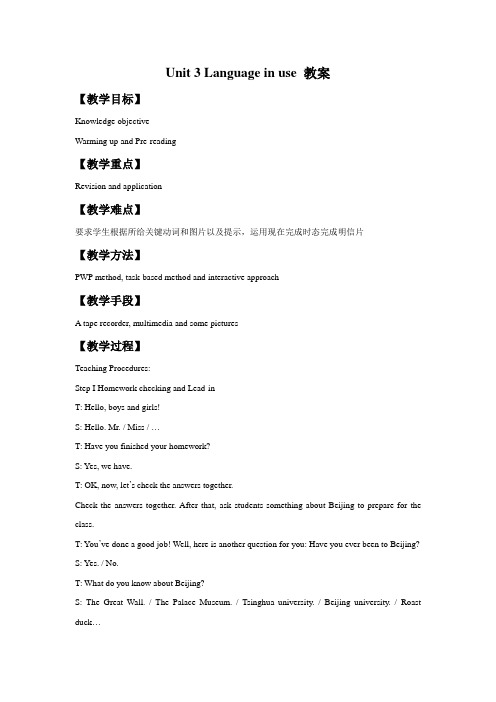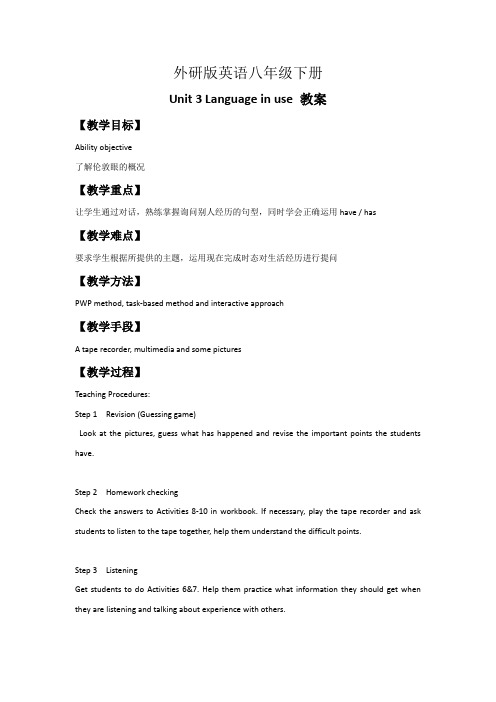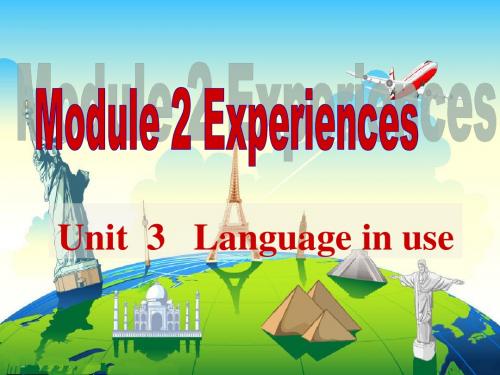新外研版八年级英语下册Module2 Unit3Language in use精品课件(共53张PPT)
外研版八下英语Module 2 Experiences Unit 3 Language in use

what's more 而且;另外 表示递进,其后通常加逗号。You're wrong, and what's more, you know it!你错了,而且你明明知道你错了!
指"发现,找到",强调找的结果。
look for
指"寻找",强调找的动作,不一定能找到。
语境串记My mobile phone is lost. I have looked for it everywhere, but I can't find it. Could you help me to find out where it is? 我的手机丢了,我到处找,但是没找到。你能帮我查明它在哪里吗?
Call today to find out more!今天打电话来了解更多信息!(教材P16)
find out 查明,弄清 find out, find与look for
find out
指"查明,弄清",强调通过观察、探索等发现事情的真相。
find
Do you love nature and want to keep forests safe?你热爱大自然并想保护森林安全吗?(教材P16)
ห้องสมุดไป่ตู้keep+宾语+adj. 使……保持某种状态
该结构中,形容词作宾语补足语,说明宾语所处的状态。有类似用法的动词还有make、find等。Rules and laws keep everyone safe. 规则和法律保证每个人的安全。I really want to make things easier for people, especially the old. 我真的想让人们的生活更轻松,尤其是老年人。(安徽中考)
外研版英语八年级下册教案:Module2ExperiencesUnit3Languageinuse

此外,实践活动中的写作练习,让我看到学生们在句子结构和篇章组织上的不足。这说明我们在今后的教学中,除了关注语法和词汇,还要加强写作技巧的培养。通过提供更多写作框架和示例,帮助他们构建更清晰、连贯的篇章。
外研版英语八年级下册教案:Module2 Experiences Unit 3 Language in use
一、教学内容
外研版英语八年级下册教案:Module 2 Experiences Unit 3 Language in use
本节课我们将学习Unit 3 Language in use,该章节内容主要包括以下部分:
1.正确运用一般过去时态描述过去的具体事件。
2.能够在实际对话中灵活使用与旅游和参观相关的词汇。
3.将语法结构与实际情境结合,进行准确的书面表达。
**教学重点:**
1.理解和掌握一般过去时态的构成和过语言实践,将所学知识应用于实际交流中。
**针对难点3:**
-创设情境,如模拟旅游访谈或写旅游日记,让学生在实际情境中练习书面表达。
-提供写作框架和指导,帮助学生构建句子和篇章结构。
四、教学流程
(一)导入新课(5分钟)
同学们,今天我们将要学习的是Module 2 Experiences中的Unit 3 Language in use。在开始之前,我想先问大家一个问题:“你们在假期中有没有去过特别的地方旅游?”这个问题与我们将要学习的内容密切相关。通过这个问题,我希望能够引起大家的兴趣和好奇心,让我们一同探索如何用英语描述我们的旅游经历。
初中英语外研社八年级下Module 2 Unit 3

现在完成时态的句子转换
(1)肯定式:They have just finished their
homework.
否定式:They haven’t finished their
homework yet.
疑问式:Have they finished their
homework yet?
简略答语:Yes, they have. / No, they haven’t.
句型转换。
即学即练
1.They have been to Mars.
They haven’t been to Mars. 否定句:_____________________________________
一般疑问句:__________________________________ Have they been to Mars?
肯定回答:__________________________________ Yes, it has.
否定回答:__________________________________ No, it hasn’t.
Why has the spacecraft 特殊疑问句(Why):__________________________
现在完成时
用法
1.表示曾经做过某事 或已经做过某事 2. 表示某人的经历
常用状语
ever, already, yet
现在完成时的结构: has/have +动词过去分词
肯定句 I have worked. He/She has worked. They have worked. 否定句 I have not worked. He/She has not worked. They have not worked.
初中英语外研版八年级下册《Module 2 Experiences Unit 3 Language

2) live in another city Have you ever lived in another city?
3) enter a singing competition Have you ever entered a singing competition?
4) travel by train Have you ever travelled by train?
1. The car is too expensive. I can’t a____ it.
2. I can’t afford ___(buy ) a car now.
1. 不要编造借口了。 你总是上学迟到。 Don’t _______ ________ an excuse. You always come late to school. 2. 十一个人组成一支足球队。
2. I often ______my friends ____my home.
我常常邀请朋友们到我家。
1. Kate is __________ girl. She’s very happy at school. A. a eighteen-year-old B. an eighteen-year-old C. an eighteen-years-old D. a eighteen-years-old
支付得起做某事
afford to do sth.
真惋惜 编造;组成,构成
That’s a pity! make up
邀请某人做某事
invite sb. to do sth.
一个十五岁的美国男孩 a fifteen-year-old American boy
最大最繁华的城市之一
外研版八年级英语下册Module 2Unit 3 Language in use 教案

Unit 3 Language in use 教案【教学目标】Knowledge objectiveWarming up and Pre-reading【教学重点】Revision and application【教学难点】要求学生根据所给关键动词和图片以及提示,运用现在完成时态完成明信片【教学方法】PWP method, task-based method and interactive approach【教学手段】A tape recorder, multimedia and some pictures【教学过程】Teaching Procedures:Step I Homework checking and Lead-inT: Hello, boys and girls!S: Hello. Mr. / Miss / …T: Have you finished your homework?S: Yes, we have.T: OK, now, let’s check the answers together.Check the answers together. After that, ask students something about Beijing to prepare for the class.T: You’ve done a good job! Well, here is another question for you: Have you ever been to Beijing? S: Yes. / No.T: What do you know about Beijing?S: The Great Wall. / The Palace Museum. / Tsinghua university. / Beijing university. / Roast duck…T: Great!Step II Speaking and writingActivities 1-4 help students use and review what they have learned about experience and the present perfect tense.1. Get the students to do Activities 1 & 2T: Since you have known Beijing better, I think it will be a piece of cake for you, right?S: Yes!T: OK. Next, do Activity 1 on your own and Activity 2 with your partner. Clear?S: Yes!Give students enough time to do the two Activities. Walk around; give them a hand if necessary. After that, ask some of the students to read their writings, and after class put up the excellent ones. And then ask some pairs to show their dialogues.2. Get the students to do Activities 3-4Before students do this, ask them to pay more attention to the past participle forms of these words. After they finished doing that, ask some of them to show their dialogues.Sample dialogue:A. Have you ever had a western meal?B: Yes, I have. Have you ever lived in another country?A: No, I haven’t.Get students to do Activity 8 on page 16 which help students practice talking about their own and other s’ experience.。
外研版英语八年级下册:Module 2 Unit 3 Language in use . 课程教学设

八年级外研版Module 2 Experiences展示课教学设计Showing experiences and learning from them一、教学内容分析本节课内容是Module2的一节展示课,紧紧围绕说经历、听经历、收获经历的话题展开。
在第一、第二单元话题语境的基础上,进一步激活学生对经历话题的兴趣,从而深度理解经历对一个人成长的重要性。
本单元训练的语法功能项目是能够运用现在完成时态询问、介绍以及收获经历。
本课突出文化与知识、情感的结合,侧重培养学生的表达与展示技能,训练学生熟练运用所学的语法功能用语去表达和展示所说话题,学生通过询问、聆听了解他人的经历并表述自己的经历,从中感悟,达到培养学生独立、自立的意识和对家乡祖国的热爱之情的目的。
二、学情分析本课授课对象是八年级学生,他们已经有着初步的人生经历,对话题充满兴趣,并且在第一、第二单元已经探讨过经历的有关话题。
我充分利用这些话题,采取步步追问的方式,进一步探讨话题,调动学生参与活动的积极性,从而让学生在经历中感悟人生,学习文化,达到提高学生综合运用语言的能力。
三、教学目标1. 语言知识目标⑴词汇和短语:展示使用本模块的基本词汇ever,enter, competition等(2)语法:能够运用现在完成时态询问、介绍以及收获经历。
2. 语言技能与学习策略目标(1) 能通过询问用现在完成时回答(2)能通过聆听获取主要信息(3) 能借助语义结构图复述转述课文(4)能流畅地表述自己的经历、收获他人的经历3. 情感态度与文化意识目标通过合作学习,展示、了解并深度理解经历对一个人成长的重要性四、教学流程活动(一):复习第一、第二单元,初步展示,激活情趣Teacher leads the students to revise Unit One by asking the following:1.What have we talked about Module Two ?2. In Unit One, whose experiences did you learn about?3. Who would like to say something about lingling ?4. Lingling has never won any prizes, but she is still entering anothercompetition,why?5. Have you ever entered any competitions? What kind?6. Have you got any prizes?7. If you are Lingling, what are you going to do?8.What about Tony? If you were Tony, would you stop trying? Why?【设计意图】: 通过语义结构图和问题的介入,导入话题,引出本课的内容, 让学生与老师对话,步步追问,充分、深层次地展示所学语言知识,同时,挖掘思想内涵,实现情感目标和价值观的展现。
外研版英语八年级下册Module 2Unit 3 Language in use 教案3

外研版英语八年级下册Unit 3 Language in use 教案【教学目标】Ability objective了解伦敦眼的概况【教学重点】让学生通过对话,熟练掌握询问别人经历的句型,同时学会正确运用have / has【教学难点】要求学生根据所提供的主题,运用现在完成时态对生活经历进行提问【教学方法】PWP method, task-based method and interactive approach【教学手段】A tape recorder, multimedia and some pictures【教学过程】Teaching Procedures:Step 1 Revision (Guessing game)Look at the pictures, guess what has happened and revise the important points the students have.Step 2 Homework checkingCheck the answers to Activities 8-10 in workbook. If necessary, play the tape recorder and ask students to listen to the tape together, help them understand the difficult points.Step 3 ListeningGet students to do Activities 6&7. Help them practice what information they should get when they are listening and talking about experience with others.Step 4 introduction伦敦眼(The London Eye)英航伦敦眼(The British Airways London Eye) 构成了伦敦天际一道亮丽的风景线。
外研版英语八年级下册Module2Unit3Language in use (共15张PPT)

Tony hasn’t seen the film.
P 14—3 Complete the sentences.
Work in pairs. Ask and answer questions.
Have you ever climbed the Great Wall?
the Great Wall
roast duck
in Egypt
seeing the world learn language
plan
work back
Have you ever…? Yes , I have . / No , I haven’t.
Write questions for the questionnaire with “Have you ever…?”; then ask and answerP14-1 You Your Activities partner
first prize: dream holiday
Tony
“Around the World in 80 Days”
enter lots of speaking competitions
hasn’t won any prize
Writing competition
make it up
write a story about a place…
- 1、下载文档前请自行甄别文档内容的完整性,平台不提供额外的编辑、内容补充、找答案等附加服务。
- 2、"仅部分预览"的文档,不可在线预览部分如存在完整性等问题,可反馈申请退款(可完整预览的文档不适用该条件!)。
- 3、如文档侵犯您的权益,请联系客服反馈,我们会尽快为您处理(人工客服工作时间:9:00-18:30)。
go Ready?
Has Lingling ever ____ won (win) any pri 7. —____ zes? hasn’t (not). — No, she _______ has ____ sent (send) Peter to work in 8. And it ____ Germany, France and China before. 9. Mike and Clare ____ have also _____ begun (begin) to learn the language of the country, Arabic. 10. For example, in Egypt, they have _____ seen _____ (see) the Pyramids, travelled on a boat on the Nile River.
根据之前的例句,试着总结一下现在完成 时的各种句型:
人称 肯定句
I have done…
否定句
I have not (haven’t) done…
疑问句及回答
第一 人称
We have done…
Have you done…? Yes, I have. No, I have not (haven’t). We have not Have you done…? (haven’t) Yes, we have. done… No, we have not (haven’t).
Module 2 Experiences
Unit 3
Language in use
Objectives
1. To summarise and consolidate the use of the present perfect 2. To be able to carry out a survey using the present perfect
1. Have ____ you ever ____ won (win) any prizes before? 2. I ____ have never _______ travelled (travel) a lot. 3. They _____ ____ (be) to many is _______ wanted (want) to go on a 4. I ____ dream holiday. have _______ stopped (stop) trying now. 5. I ______ 6. I ____ have also ______ entered (enter) lots of speaking competitions, but haven’t won any prizes.
现在完成时 Present perfect tense
现在完成时经常表示在以前某个时间已经 发生的行为或曾经做过的事情对目前有某 种影响;还可以到目前为止已经完成的事 情。
I have seen the film. I do not want to see it again. 这部电影我已经看过了,不想再看了。 My aunt has travelled all over the world. 我姑姑已经周游了世界。
6. I’ve also entered lots of speaking competitions, but haven’t won any prizes. 7. — Has Lingling ever won any prizes? — No, she hasn’t. 8. And it has sent Peter to work in Germany, 句子谓语的共同特征: France and China before. has/have (not) + 动词的过去分词 9. Mike and Clare have also begun to learn the language of the country, Arabic. 10. For example, in Egypt, they have seen the Pyramids, travelled on a boat on the Nile River.
The following examples are from the texts of this module. Now let’s observe them carefully. 1. Have you ever won any prizes before? 2. I’ve never travelled a lot. 3. They have been to many interesting places. 4. I’ve always wanted to go on a dream holiday. 5. I’ve stopped trying now.
You have done…
人称
肯定句
He/She has done…
否定句
He/She has not (hasn’t) done…
疑问句及回答
Has he/she done…? Yes, he/she has. No, he/she has not (hasn’t).
第三 人称
They have They have Have they done…? done… not (haven’t) Yes, they have. done… No, they have not (haven’t).
人称
肯定句
You have done…
否定句
疑问句及回答
第二 人称
You have not Have you done…? (haven’t) Yes, I have. done… No, I have not (haven’t). You have not Have you done…? (haven’t) Yes, we have. done… No, we have not (haven’t).
